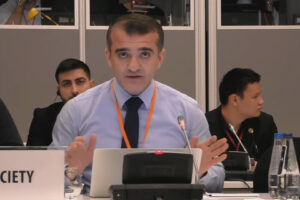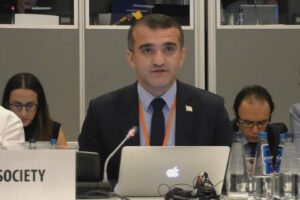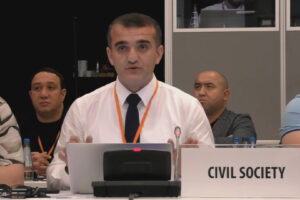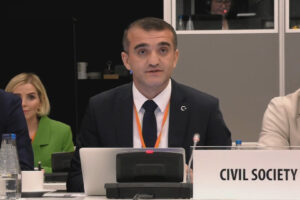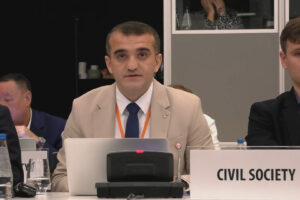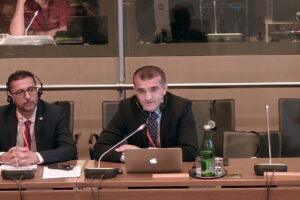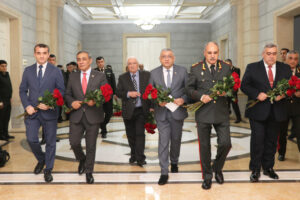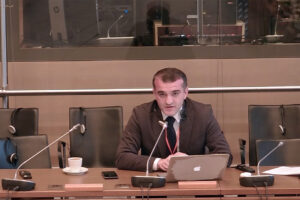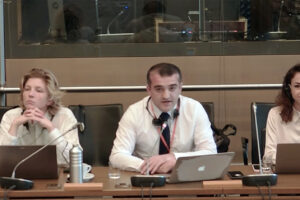“Mosques in Shusha, Aghdam and Kalbajar collapsed, armenian churches built on site” – Ahmad Shahidov criticized Armenia at the OSCE Warsaw meeting
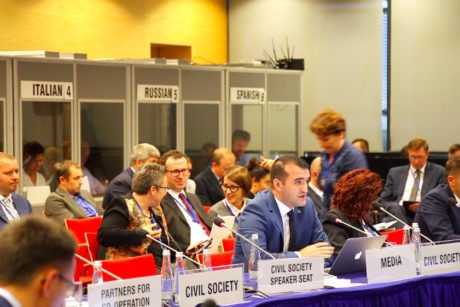
On September 14, the Human Dimension Implementation Meeting (HDIM) of OSCE participating States, organized by OSCE Office for Democratic Institutions and Human Rights (ODIHR) continued its work in Warsaw, Poland. Representatives of OSCE participating States, OSCE institutions, and OSCE executive structures, representatives of inter-governmental organizations, legal professionals, representatives of civil society and researchers from 57 participating States took part in discussions.
Taking an active part in discussion on the topic of “Freedom of thought, conscience, religion, or belief”, Head of Azerbaijan Institute for Democracy and Human Rights Dr. Ahmad Shahidov spoke about Azerbaijan’s traditions of multiculturalism and noted that people with different religions, nations and beliefs live in peace and fraternity and consider Azerbaijan as their homeland.
In the background of recent processes in Europe, religious and ethnic conflicts have increased in many countries, hate crimes have become commonplace and Europe still needs to learn a lot, said Human Rights Defender and has shown Azerbaijan as an example: “Europe can learn Azerbaijan’s tradition of multiculturalism and apply it in its life. This will lead to lasting peace and stability in Europe, said Ahmad Shahidov.
Noting that mosques, historical and cultural monuments were destroyed by the Armenian armed forces in the occupied Azerbaijani territories, Ahmad Shahidov called on the Armenian ambassador to speak about real facts and to talk about the destroyed mosques in Nagorno-Karabakh.
PS. The Human Dimension Implementation Meeting (HDIM) of OSCE participating States is Europe’s largest annual human rights and democracy conference. It is organized every year by the OSCE Office for Democratic Institutions and Human Rights (ODIHR) as a platform for the 57 OSCE participating States, the OSCE Partners for Co-operation, OSCE structures, civil society, international organizations and other relevant actors to take stock of the implementation of OSCE human dimension commitments, discuss associated challenges, share good practices and make recommendations for further improvement.
Mövzu
Oxşar xəbərlər
There was tension between the Armenian and Azerbaijani representatives at the OSCE meeting in Vienna
“Mosques in Shusha, Aghdam and Kalbajar collapsed, armenian churches built on site” – Ahmad Shahidov criticized Armenia at the OSCE Warsaw meeting
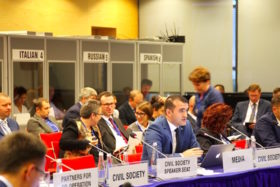 14 September 2017
14 September 2017
On September 14, the Human Dimension Implementation Meeting (HDIM) of OSCE participating States, organized by OSCE Office for Democratic Institutions and Human Rights (ODIHR) continued its work in Warsaw, Poland. Representatives of OSCE participating States, OSCE institutions, and OSCE executive structures, representatives of inter-governmental organizations, legal professionals, representatives of civil society and researchers from 57 participating States took part in discussions.
Taking an active part in discussion on the topic of “Freedom of thought, conscience, religion, or belief”, Head of Azerbaijan Institute for Democracy and Human Rights Dr. Ahmad Shahidov spoke about Azerbaijan’s traditions of multiculturalism and noted that people with different religions, nations and beliefs live in peace and fraternity and consider Azerbaijan as their homeland.
In the background of recent processes in Europe, religious and ethnic conflicts have increased in many countries, hate crimes have become commonplace and Europe still needs to learn a lot, said Human Rights Defender and has shown Azerbaijan as an example: “Europe can learn Azerbaijan’s tradition of multiculturalism and apply it in its life. This will lead to lasting peace and stability in Europe, said Ahmad Shahidov.
Noting that mosques, historical and cultural monuments were destroyed by the Armenian armed forces in the occupied Azerbaijani territories, Ahmad Shahidov called on the Armenian ambassador to speak about real facts and to talk about the destroyed mosques in Nagorno-Karabakh.
PS. The Human Dimension Implementation Meeting (HDIM) of OSCE participating States is Europe’s largest annual human rights and democracy conference. It is organized every year by the OSCE Office for Democratic Institutions and Human Rights (ODIHR) as a platform for the 57 OSCE participating States, the OSCE Partners for Co-operation, OSCE structures, civil society, international organizations and other relevant actors to take stock of the implementation of OSCE human dimension commitments, discuss associated challenges, share good practices and make recommendations for further improvement.
 @
@









